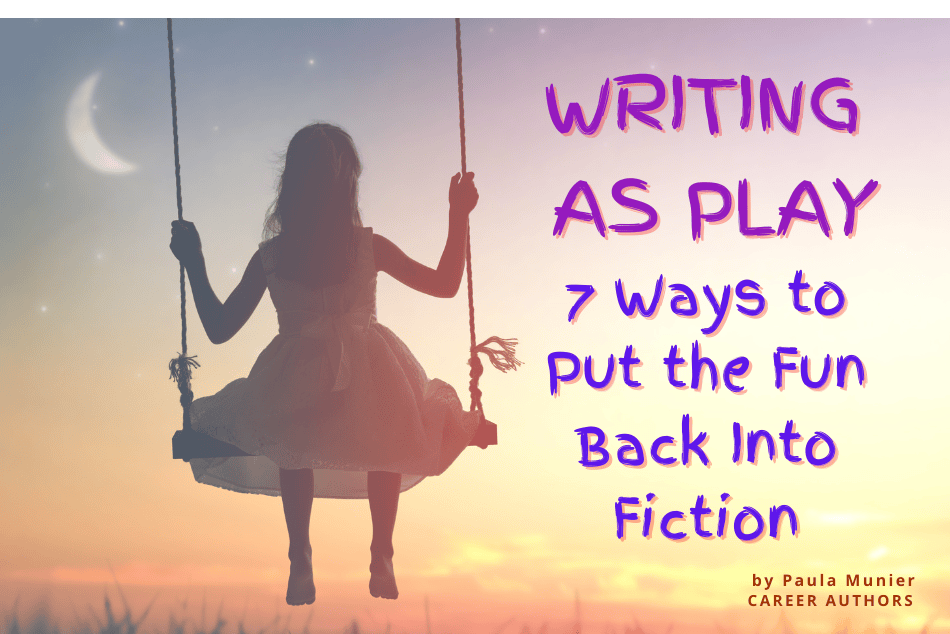Roses are red
Violets are blue
If Anthony Horowitz can have fun writing
So can you.
At a recent indie bookstore event, award-winning thriller writer Paul Doiron interviewed the one-and-only Anthony Horowitz, international bestselling author and screenwriter of such blockbusters as the Alex Rider series, Magpie Murders, Foyle’s War, Midsomer Murders, and more. Doiron asked him how he managed to write 50-plus novels, not to mention all those scripts. The prolific polymath insisted that the key to his productivity was simply that for him, writing was fun. “Fun is what I’m all about.”
When it came time for the Q&A, I took it upon myself (you’re welcome) to ask Horowitz how he managed to keep writing fun while so many writers despaired of getting through the next book (like I was doing at that very moment).
“Immerse yourself,” he said. “That keeps it fun.”
Horowitz knows where of he speaks. Numerous studies confirm the close relationships between play and creativity and immersion, that is, fun. Here are some ways to enhance your play, er, writing time:
#1
Give yourself time to play.
Pick an aspect of your story—character, plot, setting, theme—and ruminate for an hour or two. Daydreaming can boost creativity, according to verywellmind.com, because your brain is actually working hard when you let your mind wander. So, go where your imagination takes you….
#2
Go down a rabbit hole.
I went down a rabbit hole researching play theory to write this post. I spent a couple of hours checking out the works of Lev Vygotsky, Jean Piaget, Mildred Parten, Benjamin Spock, and Karl Groos. For what it’s worth, I had great fun immersing myself in their respective play theories. I know what I learned will find its way into a story someway, somehow, sometime—and I’m not talking this blog.
#3
Draw it out.
Bring the world you’ve created with words in your story to life in physical form. Draw maps of your cities and towns, paint portraits of your characters, make a collage of your plot points, decorate your houses with Pinterest boards. It’s all good fun.
#4
Play cards.
The imagery, mythology, and symbolism inherent in cards make them a cool brainstorming device. Especially for plot and character. Experiment with tarot cards and oracle decks; there’s one for everyone—from the classic Ryder-Waite deck to the Wise Dog Tarot and everything in between. I have (too) many of these decks, my favorites for writing include the Hero’s Journey Dream Oracle, the Poet Tarot, and the Literary Witches Oracle. Writing fantasy? Turn your Magic the Gathering cards into a plotting tool. There are any number of card decks from other traditions as well: Ganjifa cards, Hanafuda cards, the Celtic Tree Oracle, the (Norse) Gjallarhorn Oracle Deck, etc.
Note: If you hate cards, get yourself a Magic 8 Ball….
#5
Create a playlist.
Lots of writers create playlists for their projects. I’m one of them. For my latest Mercy Carr novel, The Night Woods, I created a playlist with The Odyssey in mind, as that ancient epic informs the theme of the story. I played it while I wrote certain scenes, to get me into the mood of the piece. I also use music in my novels from time to time. I was reminded of this recently when a fan wrote to tell me that she’d enjoyed listening to the audiobook of The Wedding Plot. In the book, my heroine teaches a yoga class, and she uses a playlist for the class. The reader couldn’t make out some of the names of the songs and performers, and she asked me to send the playlist to her. I was surprised—and delighted—by this request, which I happily granted.
#6
“Pin the Tail on Your Story.”
- Don’t have a setting? Close your eyes and stick a pin in a map or spin a globe and stop it with your finger. Bingo!
- Need a name for a character? Open a baby names book at random and peruse the page. Or try an online name generator.
- Stuck on Chapter X? Pull ten novels in your genre off your bookshelf and turn to Chapter X. What happens—and how can you play with that for your story?
#7
Go outside and play.
There’s a reason our parents used to tell us to “go outside and play.” And, yes, maybe it was to get us out of the house, but study after study shows that time spent in nature improves memory, boosts cognitive performance, reduces stress, and promotes relaxation. In fact, in one study, Outward Bound participants experienced a fifty percent improvement in creativity after just a couple of days outdoors. (For more on what nature can do for you, read The Nature Fix by Florence Williams.
What are you waiting for?
Time to write? Nah, it’s time to play.





